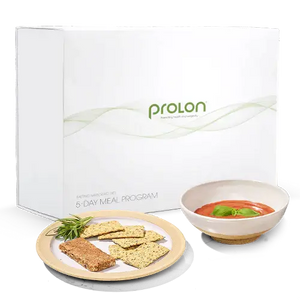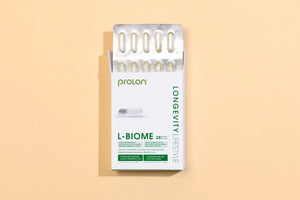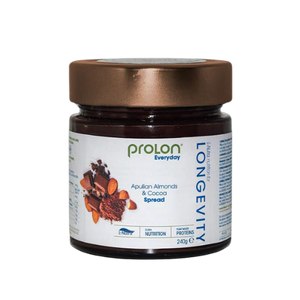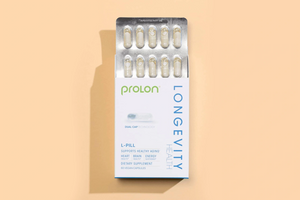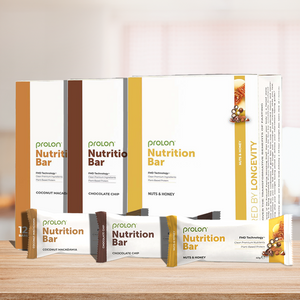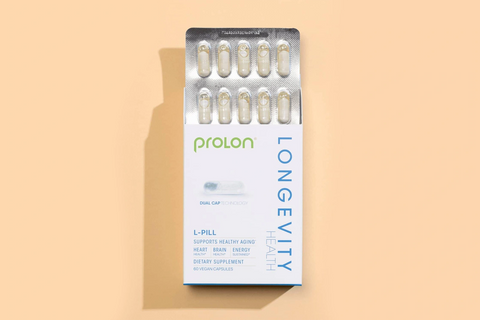



L-Pill
Product information
£50.15L-Pill was developed by longevity scientists and doctors in collaboration with the Longevity Institute at the University of Southern California.
It is a dual-cap technology that includes a high concentration of naturally occurring ingredients that were carefully selected to be safe.
- Brain Health
- 100% vegan
Product options
 The L-Pill is the only supplement that I would take - Dr. Valter Longo
The L-Pill is the only supplement that I would take - Dr. Valter Longo

L-PILL for healthy aging
The quality and rate of our biological aging are the main determinants of a long and healthy life. The strength of L-Pill lies in its unique combination of four natural ingredients that have been studied for their potential benefits in healthy aging, with energizing and antioxidant functions.
DHA
is an essential omega-3 polyunsaturated fatty acid, which is part of the composition of phospholipids in various organs, including the heart, brain and retina. DHA intake contributes to the maintenance of physiological brain function and normal visual capacity. Studies show that European populations consume few foods containing DHA, which creates deficiency situations that can be remedied by supplementation.
Lysine
It is an essential amino acid for humans, which must therefore be supplied through food. Lysine plays several roles in humans, mainly in proteinogenesis, but also in the cross-linking of collagen polypeptides.
Wasabi Japonica extract rich in isothiocyanates
Isothiocyanates come from the hydrolysis of glucosinolates, sulfur compounds with a characteristic odor, which is present in cruciferous vegetables, well known for their digestive function.
Cane sugar extract rich in polyphenols and flavonoids
Polyphenols constitute a large group of natural organic substances including flavonoids. Many studies have linked the intake of flavonoids, anti-aging action and the ability to eliminate free radicals through electron transfer processes.
Green tea extract (catechins, caffeine)
Camellia sinensis leaf extract, in accordance with Ministry of Health guidelines, contributes to the drainage of body fluids, body weight balance, normal intestinal function, tone and anti-oxidation.
WHY L-PILL
Innovation meets nature
Our L-PILL guarantees optimal dosage of these ingredients in a safe and effective way. DHA is bound to the essential amino acid L-lysine to form a salt, which makes DHA more easily assimilated by the body, increasing its effectiveness.


HOW IT WORKS
How and when to use it
Take two capsules per day before meals. It can be used daily by anyone aged 18 to 80. You can stop and start again at any time, at your convenience. If you have any health problems, consult your doctor before taking them. Do not take L-Pill if you are allergic to any of its ingredients. In order to maximize the benefits of L-Pill, it is recommended to take it after: ProLon Fasting Mimicking Diet, ProLon Reset, or periods of intermittent fasting with the Nutrition Bar or the Fasting Shake to maintain the benefits obtained in terms of the intestinal microbiota and antioxidant status.
With L-Pill from ProLon, you don’t choose just a supplement, but a partner in your journey to longevity and healthy aging. As we continually seek to advance the understanding of longevity, we are committed to bringing you the best that science and nature can offer today.
Selected references
Algal Oil DHA
- Costantini L, Molinari R, Farinon B, Merendino N. Impact of Omega-3 Fatty Acids on the Gut Microbiota. Int J Mol Sci. 2017 Dec 7;18(12):2645 https://www.ncbi.nlm.nih.gov/pmc/articles/PMC5751248/
- Jayapala H, Lim SY. N-3 Polyunsaturated Fatty Acids and Gut Microbiota. Comb Chem High Throughput Screen. 2022 Jul 1. doi: https://pubmed.ncbi.nlm.nih.gov/35786331/
- Rousseau G. Microbiota, a New Playground for the Omega-3 Polyunsaturated Fatty Acids in Cardiovascular Diseases. Mar Drugs. 2021 Jan 23;19(2):54. https://www.ncbi.nlm.nih.gov/pmc/articles/PMC7931107/
- Stillwell W, Wassall SR. Docosahexaenoic acid: membrane properties of a unique fatty acid. Chem Phys Lipids. 2003;126(1):1-27.
- Serhan CN. Novel Pro-Resolving Lipid Mediators in Inflammation Are Leads for Resolution Physiology. Nature. 2014 Jun 5; 510(7503): 92–101.
- Kotani S, Sakaguchi E, Warashina S, et al. Dietary supplementation of arachidonic and docosahexaenoic acids improves cognitive dysfunction. Neurosci Res 2006;56(2):159-64.
- Innes JK, Calder PC. Marine Omega-3 (N-3) Fatty Acids for Cardiovascular Health: An Update for 2020. Int J Mol Sci. 2020 Feb 18;21(4):1362.
- SanGiovanni JP, Chew EY. The role of omega-3 long-chain polyunsaturated fatty acids in health and disease of the retina. Prog Retin Eye Res. 2005;24(1):87-138
Wasabi Japonica
- 6-(methylsulfinyl)hexyl isothiocyanate (6-MITC) from Wasabia japonica alleviates inftammatory bowel disease (IBD) by potential inhibition of glycogen synthase kinase 3 beta (GSK-3b)_European Journal of Medicinal Chemistry _2021.
- Anti-Diabetic Obesity Effects of Wasabia Japonica Matsum Leaf Extract on 45% Kcal High-Fat Diet-Fed Mice_Nutrients_2021
- Anti-oxidant and Anti-hypercholesterolemic Activities of Wasabia japonica_eCAM_2010_IF2.6. 9
- Anticancer and Anti-Neuroinftammatory Constituents Isolated from the Roots of Wasabia japonica_an- tioxidants_2022
- Bactericidal activity of wasabi (Wasabia japonica) against Helicobacter pylori_International Journal of Food Microbiology_2004
- Inhibitory effects of Japanese horseradish (Wasabia japonica) on the formation and genotoxicity of a potent carcinogen, acrylamide_J Sci Food Agric_2017
- Wasabi leaf extracts attenuate adipocyte hypertrophy through PPARγ and AMPK_Bioscience, Biotechnolo- gy, and Biochemistry_2016
- Molecular Mechanisms Underlying Anti-Inftammatory Actions of 6-(Methylsulfinyl)hexyl Isothiocyanate Derived from Wasabi (Wasabia japonica )_Advances in Pharmacological Sciences_2012
- Neuroprotective and Anti-Inftammatory Activities of Allyl Isothiocyanate through Attenuation of JNK/NF-κ
- Anti-angiogenic effects of dietary isothiocyanates/ Mechanisms of action and implications for human health_Biochemical Pharmacology_2011
- Anti-inftammatory potential of allyl-isothiocyanate – role of Nrf2, NF-(k)B and microRNA-155_J. Cell. Mol.
Med._2012
- Neuroprotective and Anti-Inftammatory Activities of Allyl Isothiocyanate through Attenuation of JNK/NF-κ B/TNF-α Signaling_Int. J. Mol. Sci_2017_
Flavonoids and polyphenols from cane sugar extract
- Antithrombotic activity of ftavonoids and polyphenols rich plant speciesMIRZA BOJIĆ ; University of Zagreb Faculty of Pharmacy and Biochemistry, Department of Medicinal Chemistry, HR-10000 Zagreb, Croatia
- Raúl Arcusa, Juan Ángel Carillo, Begoña Cerdá, Thierry Durand, Ángel Gil-Izquierdo, Sonia Medina, Jean-Marie Galano, María Pilar Zafrilla, Javier Marhuenda, Ability of a Polyphenol-Rich Nutraceutical to Reduce Central Nervous System Lipid Peroxidation by Analysis of Oxylipins in Urine: A Randomized, Double-Blind, Place- bo-Controlled Clinical Trial, Antioxidants, 10.3390/antiox12030721, 12, 3, (721), (2023).
- Michael Aviram, Bianca Fuhrman,Polyph enolic ftavonoids inhibit macrophage-mediated oxidation of LDL and attenuate atherogenesis,Atherosclerosis
- Postprandial insulin and glucose levels are reduced in healthy subjects when a standardised breakfast meal is supplemented with a filtered sugarcane molasses concentrate_EurJnutr_2015
- Antioxidant and Anti-Diabetic Functions of a Polyphenol-Rich Sugarcane Extract_JAmerCollofNutr_2019_
- A polyphenol rich sugarcane extract as a modulator for inftammation and T neurological disorders_Phar- maNutr_2020
- Immunomodulatory Properties of Polyphenol-Rich Sugarcane Extract on Human Monocytes_Biologic- s_2021
- Age-Deterring and Skin Care Function of a Polyphenol Rich Sugarcane Concentrate_Cosmetics_2020
- Antioxidant activity and polyphenol composition of sugarcane molasses extract_JFoodChem_2020_
- Phytochemical profile of sugarcane and its potential health aspects_PhcogRev_2015_I
Catechins and caffeine from green tea extract
- Luis Goya, Ricardo San Román, Sonia de Pascual-Teresa, Polyphenols’ Effect on Cerebrovascular Health, Current Medicinal Chemistry, 10.2174/0929867328666211129123459, 29, 6, (1029-1044), (2022).
- Sally C. Duplantier, Christopher D. Gardner, A Critical Review of the Study of Neuroprotective Diets to Reduce Cognitive Decline, Nutrients, 10.3390/nu13072264, 13, 7, (2264), (2021).
- Bradley J. McEwen, Impact of cardiometabolic disease on cognitive function, Nutraceuticals in Brain Health and Beyond, 10.1016/B978-0-12-820593-8.00025-2, (357-368), (2021).
- Chacko SM, Thambi PT, Kuttan R, Nishigaki I. Beneficial effects of green tea: a literature review. Chin Med. 2010 Apr 6;5:13. doi: 10.1186/1749-8546-5-13. PMID: 20370896; PMCID: PMC2855614.
- Prasanth MI, Sivamaruthi BS, Chaiyasut C,Tencomnao T. A Review of the Role of Green Tea (Camellia sinen- sis) in Antiphotoaging, Stress Resistance, Neuroprotection, and Autophagy. Nutrients. 2019 Feb 23;11(2):474. doi: 10.3390/nu11020474. PMID: 30813433; PMCID: PMC6412948.
- Mengyuan Si, Zhongyuan Liu, Yingchao Dou, Guanyu Yang, Synthesis of Catechol Thioethers through Gallic Acid/Fe2(SO4)3 Catalyzed Aerobic Oxidative Coupling of Thiols and Catechol Derivatives, ChemistrySelect, 10.1002/slct.202103752, 6, 48, (13781-13785), (2021).

